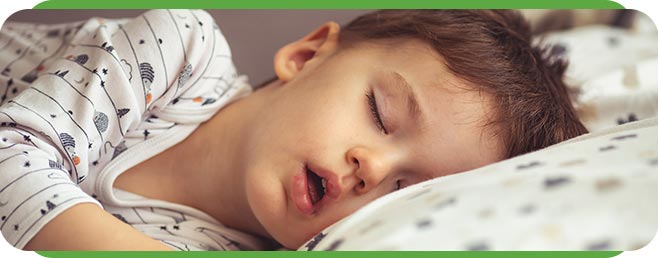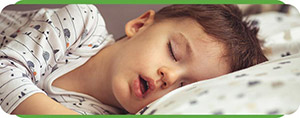Pediatric Sleep-Related Breathing Disorders Treatment Doctor Q&A
Pediatric sleep-disordered breathing refers to conditions in which a child encounters difficulties in breathing while sleeping, thereby depriving them of essential oxygen intake. The symptoms of sleep-disordered breathing in children are often prominently evident during their sleep, but some are present during the day, giving rise to noticeable behavioral changes. Pediatric sleep-disordered breathing treatment is available at Koala® Center for Sleep & TMJ Disorders. For more information, please contact us or book an appointment online. We are conveniently located in Bloomington IL, Peoria/Dunlap IL, El Paso TX, and Wausau WI. Visit us online today for directions to our leading healthcare clinics.


Table of Contents:
What are some of the types of breathing-related sleep disorders?
What are the symptoms of sleep-disordered breathing in kids?
What treatments are available for sleep-disordered breathing in children?
What risk factors are associated with sleep-disordered breathing in children?
Breathing-related sleep disorders encompass various conditions that, despite their shared impact on an individual’s breathing, differ in terms of their causes and severity.
One of the most prevalent and serious among these disorders is sleep apnea. In sleep apnea, the airway experiences recurrent collapses during sleep, leading to intermittent lapses in breathing. These interruptions not only disrupt the continuity of sleep but also influence the body’s oxygen levels.
Sleep apnea can result from either a lack of effort to breathe, where the brain fails to transmit proper signals to the respiratory muscles, or a failure of the respiratory muscles to respond to the brain’s signals.
Obstructive sleep-disordered breathing is a prevalent condition observed in most children with breathing-related sleep disorders. In this scenario, an obstruction in the airway hinders a child’s ability to breathe, making the process difficult, and at times, impossible.
Another type of breathing-related sleep disorder is sleep-related hypoxemia disorder, which primarily stems from an underlying health issue affecting breathing, such as various types of lung conditions. This disorder is often a consequence of other health problems impacting respiratory function.
Additionally, there is catathrenia, characterized by an abnormal breathing pattern during sleep. Most notably, patients experiencing episodes of catathrenia exhale slowly and emit a groan-like sound during their sleep.
Given the wide range of potential breathing-related sleep disorders, it is important to consult a specialist at Koala® Center for Sleep & TMJ Disorders for an accurate diagnosis and treatment plan.
Pediatric sleep-disordered breathing refers to conditions in which a child encounters difficulties in breathing while sleeping, thereby depriving them of essential oxygen intake. The symptoms of sleep-disordered breathing in children are often prominently evident during their sleep, but some can also manifest in their waking hours, giving rise to noticeable behavioral changes.
One common symptom of sleep-disordered breathing in children is frequent snoring, which occurs on most nights. This snoring may be intermittently disrupted by episodes of complete airway blockage, marked by gasping and snorting sounds that coincide with abrupt awakenings from sleep. Conditions such as these can also result in heightened nocturnal urine production, potentially leading to bedwetting issues. Due to the challenges they face during sleep, some children with sleep-disordered breathing may struggle to produce adequate growth hormones, potentially resulting in an abnormal delay in their growth and overall development.
Behavioral changes during a child’s waking hours can also point to sleep-disordered breathing problems. If your child seems fatigued, irritable, low energy, is having difficulty focusing, or experiencing frequent headaches these can all point to issues stemming from sleep-disordered breathing.
Given the varied nature of sleep-disordered breathing causes in children, treatments will differ on a case-by-case basis. The specialists at Koala® Center for Sleep & TMJ Disorders will work with parents to develop a treatment plan tailored to each child’s unique needs.
The treatment of sleep-disordered breathing in children often begins with an evaluation of potential contributing factors. Enlarged tonsils and adenoids frequently serve as a common underlying cause for this condition. In select cases, when symptoms are significant and persistent, surgical removal of the tonsils and adenoids may be considered as a treatment option.
For milder cases, a conservative approach may be initially recommended with close monitoring of the child’s condition. Oral appliances can offer an excellent noninvasive alternative for a wide range of sleep conditions. Additional therapeutic approaches may also be explored, depending on the specific needs of the child.
These may include strategies such as weight management, the use of continuous positive airway pressure (CPAP), or, in some instances, further surgical procedures, all tailored to address the individual needs and severity of the sleep-disordered breathing in the child. In cases where sleep-disordered breathing is caused by a different underlying health issue, addressing that condition should also be explored.
A wide range of risk factors exist for sleep-disordered breathing in children. These factors range from overall health and wellness to underlying conditions or family history. Health issues such as asthma or allergies can put children at risk for sleep-disordered breathing.
Parents’ sleep patterns or history of sleep sickness can also correlate with a higher risk of sleep-disordered breathing in children. Environmental factors such as a child’s sleep environment such as pillow material can play a role. Children who are overweight or generally less healthy than they could be will also run a greater risk of developing sleep issues.

Additional Services You May Need
▸ KoalaKIDZzz®
▸ Sleep Apnea
▸ Snoring
▸ TMJ Disorder
▸ Fatigue
▸ Sleep Disorders
▸ Weight Loss
▸ CPAP Alternative
▸ Oral Appliances




